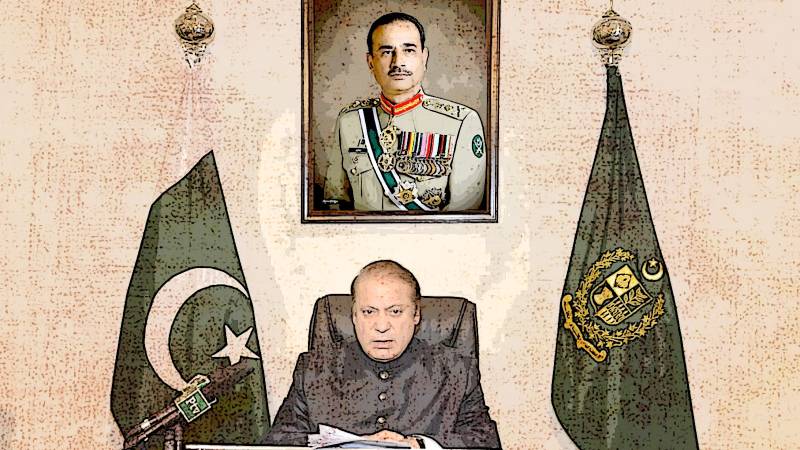
Will former Prime Minister Nawaz Sharif create history once again? He returned home on his 'flight of hope' and addressed a massive Pakistan Muslim League-Nawaz (PML-N) rally on October 21 in Lahore, Punjab.
Indeed, Sharif has left his mark on history three times in the past, only to be ousted from power due to successive military and judicial interventions. He has managed to not only survive but also make triumphant returns each time. Sharif is a great survivor.
After a brief period of confrontational politics against the military leadership, particularly former COAS General Qamar Javed Bajwa, it appears that Sharif has chosen to reconcile and consign past grievances to divine will. But will he continue to uphold his promise to compel the establishment to respect the sovereignty of the people by valuing the sanctity of the ballot (vote ko izzat do)? Will he let bygones be bygones?
While he may achieve success, it might come at the expense of his unwavering commitment to civilian supremacy. He has agreed to “live and let live” with a powerful military establishment.
The sight of Greater Iqbal Park in Lahore was so overwhelming that it brought tears to the eyes of both a protective father and his devoted daughter, Maryam. It was a moment of vindication and emergence from the prolonged emotional distress they have endured in their political journey.
Many observers are wondering whether the political landscape has shifted in Sharif's favour. His demand for a level playing field seems to have been partially met. The lavish protocol provided to the former PM on his return from the self-imposed exile suggests a changing dynamic.
Those who hold authoritative control over the state's affairs and safeguard the nation have taken the reins of a country teetering on the edge of unpredictable instability. With only one plausible candidate for the position of prime minister remaining, Nawaz Sharif himself, the other potential contender, the talented Bilawal Bhutto, has been removed from the unpredictable contest due to the paternal compassion of the elder statesman, Asif Ali Zardari. Imran Khan, Nawaz Sharif's main rival in Punjab, currently resides behind bars.
He might be the most suitable political figure within the context of 'elite capture' under the dominance of the Garrison. However, he does not possess the 'star power’ – for none can match his younger brother, Shehbaz Sharif, in terms of swiftly aligning with the powers that be. Interestingly, Maryam Nawaz and her cousin publicly celebrated both 'N' for herself and 'S' for Hamza Shahbaz, illustrating a united front within the House of Sharifs.
It is imperative for politicians to agree on the rules of the political game, adhere to democratic norms, and ensure that security institutions and the judiciary follow the constitution
The Sharif Family's political strategy revolves around a dynamic of alternating between confrontation and conciliation, with each member taking turns to lead the way. Nawaz Sharif might take the lead in the election campaign, only to later make way for his more accommodating brother.
Following the establishment of a hybrid regime of Imran Khan through internal pressures, the subsequent 16-month hybrid regime of Shehbaz Sharif relinquished significant civilian authority to the Garrison. Currently, various apex committees, including the Special Investment Facilitation Council (SIFC), wield authority that surpasses that of federal and provincial cabinets. What remains for civilians is a quasi-civilian Anwaar ul Haq Kakar proxy model.
If the upcoming elections do not adhere to the principles of being free and fair, and there's only one 'lion' dominating the political landscape while other parties mimic his policies, the entire democratic exercise may become futile and lack any legitimate standing. The pre-election 'political engineering' is already underway, and the eventual outcome remains uncertain.
After the failed street uprising on May 9, many politicians, driven by their opposition to Imran Khan, have engaged in a competitive race among political proxies. A beleaguered Pakistan Tehreek-e-Insaf remained largely silent in the aftermath of their leader's misadventure. Imran Khan resorted to the 'foreign conspiracy' narrative to salvage his otherwise precarious prospects but found himself behind bars following the failure of his adventurous move.
Such events, like the one on May 9, occur worldwide, including the attack by Trump supporters on Capitol Hill after the last US election. However, supporters of the Pakistani Trump seemed to forget that staging protests in Pakistan's cantonments, especially in
In the past, due to political infighting and military dominance, many elected and popular prime ministers, such as Huseyn Shaheed Suhrawardy, Sheikh Mujibur Rahman, Zulfikar Ali Bhutto, Benazir Bhutto, Nawaz Sharif, and Imran Khan, were unceremoniously and illegitimately removed from power. Conversely, the people's democratic resistance movements against Generals Ayub Khan, Yahya Khan, and Ziaul Haq successfully contributed to the restoration of democracy.
Pakistan is currently grappling with an extensive, multi-dimensional crisis that cannot be resolved through superficial measures or the use of force. Pakistan's governance cannot be modelled after countries like Egypt or Myanmar. Throughout the country’s history, military rulers have either had to transition to civilian rule or have been defeated by popular movements, such as in 1968, 1970, 1986, and 2018.
As a seasoned politician, Nawaz Sharif should take the initiative to invite all political parties to come together and work on a new Charter of Democracy, Charter of Human Rights, and Charter of Economy. It is imperative for politicians to agree on the rules of the political game, adhere to democratic norms, and ensure that security institutions and the judiciary follow the Constitution.
Without such consensus and adherence to constitutional principles, Pakistan will continue to grapple in the same darkness.
In light of this situation, it's essential to question how Nawaz Sharif, if elected for a fourth term, would differ from his previous three tenures in power.

